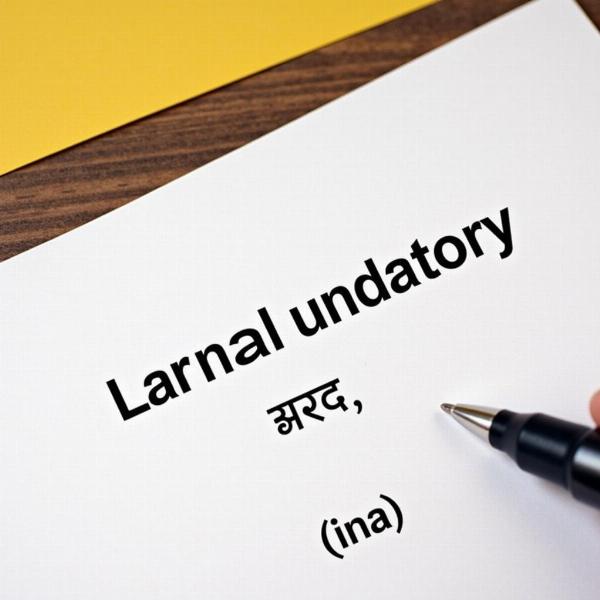Understanding the concept of “not mandatory” can be crucial in various contexts, from legal documents to everyday conversations. While it might seem straightforward, accurately translating and interpreting this phrase in Hindi requires a nuanced understanding of both languages. This article explores the various ways to express “not mandatory” in Hindi, delving into the subtle differences between them and providing practical examples to ensure clarity.
Different Ways to Say “Not Mandatory” in Hindi
Several Hindi phrases can convey the meaning of “not mandatory,” each with its own specific connotation. Choosing the right phrase depends heavily on the context and the desired level of formality.
- अनिवार्य नहीं (Anivārya nahīn): This is perhaps the most common and direct translation of “not mandatory.” It clearly states that something is not required or compulsory.
- ज़रूरी नहीं (Zarūrī nahīn): This phrase translates to “not necessary.” It emphasizes the lack of necessity rather than the absence of a requirement.
- आवश्यक नहीं (Āvashyak nahīn): Similar to “zaruri nahin,” this translates to “not essential” and highlights that something is not crucial or indispensable.
- बाध्यकारी नहीं (Bādhyakārī nahīn): This more formal phrase signifies “not binding” or “not obligatory.” It is often used in legal or official contexts.
Choosing the Right Phrase: Context is Key
While all the above phrases convey a sense of non-compulsion, their subtle differences can significantly impact the meaning. For instance, saying something is “anivaarya nahin” (not mandatory) in the context of a dress code suggests flexibility, while using “zaruri nahin” (not necessary) might imply that it’s better to adhere to the code.
Consider these examples:
- Formal Context: Submitting a supporting document with your application is bādhyakārī nahīn (not mandatory).
- Informal Context: Wearing a tie to the party is zarūrī nahīn (not necessary).
- General Context: Attending the workshop is anivaarya nahin (not mandatory) but highly recommended.
“Not Mandatory” in Legal and Official Documents
In legal and official documents, accuracy is paramount. Using the correct Hindi equivalent of “not mandatory” can prevent misunderstandings and legal disputes. “Bādhyakārī nahīn” is often the preferred choice in such situations, as it clearly communicates the absence of a legal obligation.
 Legal Document Translation
Legal Document Translation
Understanding the Cultural Implications
Indian culture often values compliance and respect for authority. While something might be “not mandatory” in a strictly legal sense, social pressures can sometimes make it feel obligatory. Understanding this cultural nuance can help navigate social situations more effectively.
Not Mandatory vs. Optional: Is There a Difference?
While “not mandatory” and “optional” are often used interchangeably, they have slightly different connotations. “Optional” implies a choice, while “not mandatory” simply indicates the absence of a requirement. In Hindi, “vaikalpik” (वैकल्पिक) is the common translation for “optional.”
FAQ
- What is the most common Hindi translation for “not mandatory”? Anivārya nahīn (अनिवार्य नहीं) is the most common and direct translation.
- When should I use “bādhyakārī nahīn”? Use bādhyakārī nahīn (बाध्यकारी नहीं) in formal or legal contexts.
- What’s the difference between “not mandatory” and “optional”? While often used interchangeably, “optional” emphasizes choice, while “not mandatory” simply indicates the absence of a requirement.
- Is there a cultural aspect to consider when using “not mandatory” in India? Yes, social pressures can sometimes make something feel obligatory even if it’s not legally mandatory.
- What are some other ways to say “not mandatory” in Hindi? Other phrases include zarūrī nahīn (ज़रूरी नहीं) and āvashyak nahīn (आवश्यक नहीं).
Related Articles
- commingling meaning in hindi
- co founder meaning in hindi
- solemnized meaning in hindi
- have you migrated from the state meaning in hindi
Conclusion
Understanding the nuances of “not mandatory” in Hindi is essential for effective communication. By carefully considering the context and choosing the appropriate phrase, you can ensure clarity and avoid misunderstandings. Whether you’re dealing with legal documents, navigating social situations, or simply having a casual conversation, using the right words can make all the difference.
Meaning-Hindi.in is your one-stop solution for all your Hindi translation needs. We offer a range of professional translation services, specializing in business, legal, technical, website localization, educational, and urgent translations. Contact us today for accurate and culturally sensitive translations that bridge the language gap. Email: [email protected], Phone: +91 11-4502-7584. Let Meaning-Hindi.in help you connect with the world through the power of language.